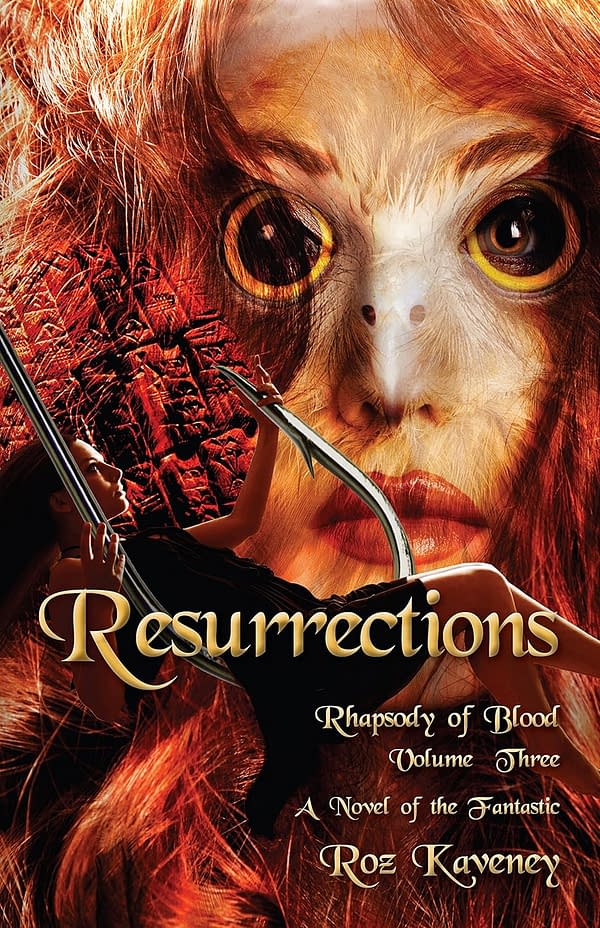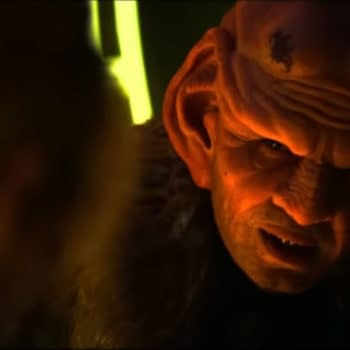Posted in: Pop Culture, TV | Tagged: buffy the vampire slayer, Catullus, game of thrones, george r r martin, John Clute, neil gaiman, Peter Nicholls, poetry, Roz Kaveney, The Encyclopedia of Science Fiction, The Sandman
Rhapsody of Blood: Roz Kaveney Discusses Epic, Subversive Fantasy Saga
Poet, literary critic, LGBTQ activist & author Roz Kaveney spoke with us about her completed five-novel fantasy saga, "Rhapsody of Blood."
Article Summary
- Roz Kaveney discusses her five-book saga Rhapsody of Blood.
- The series blends fantasy with sharp commentary on power and history.
- Heroines Mara and Emma embody complex aspects of female heroism.
- Kaveney innovates with a unique, flexible system of magic in her work.
Roz Kaveney has not only been at the flashpoint of LGBTQ politics and activism since Stonewall and is a respected literary critic in the UK who has written for The Times Literary Supplement but her friendship with many of the key Science Fiction and Fantasy writers of the last forty years, including with Neil Gaiman. Her covert influence and the results of their many conversations have found their way into The Sandman, including the Netflix series. She was a contributor to The Encyclopedia of Science Fiction, edited by John Clute and Peter Nicholls, and an editor to The Encyclopedia of Fantasy, the definite books on everything you need to know about those genres. She was one of the critics who identified and helped define the main tropes in Buffy the Vampire Slayer that now pervades virtually all Fantasy books and TV shows. In fact, she was a namer of many of the tropes in the fantasy genre that we now take for granted.

Even with her activism and reviewing work, writing a book of poems and a new translation of Roman poet Catullus, getting her fictionalised memoir Tiny Pieces of Skull published, and writing a second volume, Kaveney has been writing an epic fantasy saga since 2012, Rhapsody of Blood, and published its fifth and final volume in late 2023. The five volumes of "Rhapsody of Blood" follow two heroines: Mara, an immortal warrior from since the beginning of time who hunts those who want to become gods through the blood sacrifice of innocents, and Emma, a contemporary British academic who sees her girlfriend killed by supernatural horrors and finds herself a reluctant diplomat mediating the human world and the world of gods trying to keep them from killing all of humanity.
The two women eventually intersect in a saga that spans thousands of years of world history. If you love Buffy, Game of Thrones, and the works of Neil Gaiman, Kaveney's fantasy saga is as heady, unpredictable, shocking, snarky, subversive, and funny as you could ever wish for, with a unique commentary on gender, politics, and history that comes from decades of personal experience. Rhapsody of Blood is complete with a beginning, middle, and end in five books while we continue to wait for George R.R. Martin to finish the Game of Thrones saga. We had a chance to talk to Roz Kaveney about her saga.
Rhapsody of Blood is probably the most surprising and edgy epic fantasy saga that nobody knows but should. You spent the better part of a decade writing it on top of continuing your political activism. I remember when you originally planned it as a trilogy, and then it became four books, and now it's complete at five. It's a fantasy saga that hits all the right buttons: it's about History, mythology, religion, magic, and snarky, flawed but irrepressible heroines across time as they fight the good fight. This might be a bit basic, but can you talk about what the series is about?
Roz Kaveney: The pompous answer is that it's about power – who has it, how they get it, what it does to them, what it costs them – and about responsibility – and how they have to go together. And the other answer is that it's about all the things I think are cool – snappy comebacks, thinking fast on your feet, fast-paced action scenes, long historical vistas of time. And it's about love and chosen family, and what you do when there's a sense that the world around you is going irrevocably to shit, and saving what you can, one person at a time.
What inspired you to write this fantasy saga after decades as a literary critic?
Roz Kaveney: There's a thing some writers will say to you when you're a reviewer, which is that, clever as you are, you're not really getting it – and that stings a bit and would have gone on stinging if I'd written something smallscale, modest and sensitive. So my ego demanded that I write something on the vastest possible scale. And I've got quite tired of a lot of the tropes of big fantasy – partly because of reviewing and working on the Clute Encyclopedia – and I wanted to do something different that used the tropes in a way that renewed them. And I wanted to write something that didn't suck politically and morally.
The heroines of Rhapsody of Blood each represent a different aspect of female archetypes but also heroism. Can you tell the readers more about them?
Roz Kaveney: I love all the sword maidens of classic fantasy from Jirel through Eowyn to Alyx, but I wanted a warrior woman with a really complicated inner life like some of my favourite women private eyes, which is why I made her the viewpoint character for large parts of the book. And I needed a second heroine who was empathic and smart. So, Mara and Emma – Mara, who has pursued her career as enforcer of her own rule about those who try to become gods through murder and torture, and Emma, a modern woman with a dead girlfriend – now a ghost – making her way in a new world of gods and monsters with a mysterious employer and only wit and charm to help her.
Now talk us through your version of Magic, which has a whole system that no one has really done before in fantasy novels.
Roz Kaveney: Magic in my universe is a way of focusing will so as to change the world– and mostly it works – if you believe, it will. So, in Reflections (Rhapsody of Blood Vol. 2), Robespierre uses in his rituals Mesmer's ideas about magnets, and they more or less work because he believes they will. In the last book, Emma does a major complex work that uses standard stuff like "part for the whole" and like-for-like, which works because she thinks poetically. Magic in my world only has the rules the practitioner imposes on it – whereas alchemy, mathematics, and music have inherent rules that the practitioner has to discover and work with. And of course, there are beings that are inherently magical and bound by their natures…
And how does this all tie into history, religion, and mythology, including Biblical history?
Roz Kaveney: Well, given my job as a publisher's reader and my retentive memory, I've read a lot and know a lot, and I just wanted to play with that material because the more you know, the more there is to play with – a lot of incidents in the book actually happened just not quite in the way I describe. I did a lot of research, but the point is to do just enough that you can plot the things you want to do and keep them plausible and not so much that it forces you in certain directions. Important not to cheat, though – I originally wanted to write about Jonathan Wild, who, in early C18, ran both London's early police force and organized its criminal world. But he was hanged before Voltaire came to London…Several of the versions of Wild in literature have a daughter – so I wrote her instead, and she became one of my favourite characters.
London is a major character in the whole saga, which makes this series one of the quintessential fantasy novels about the mythology of an already mythic city. Can you tell us why and your approach to it?
Roz Kaveney: It's a book about cities as the place where much of what's crucial happens – London is where I live, so I know it best, but there's a lot of LA and Paris and Alexandria as well that I hope are as real, but the London scenes generally have very specific locations in places I visit a lot like the bagel shop…
All five volumes of Rhapsody of Blood are now available.




















